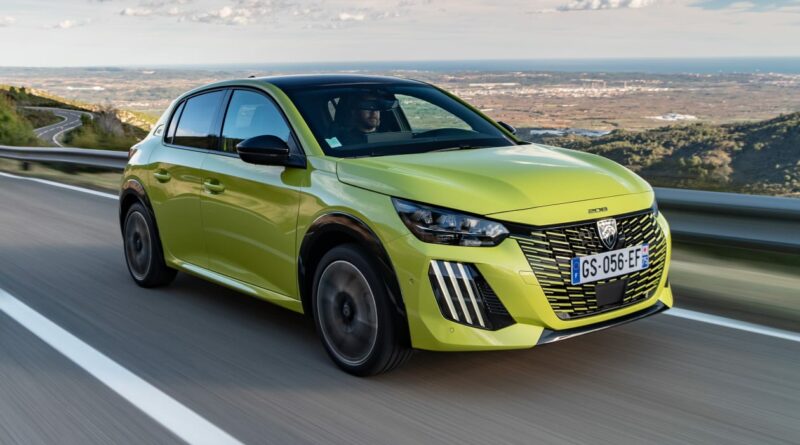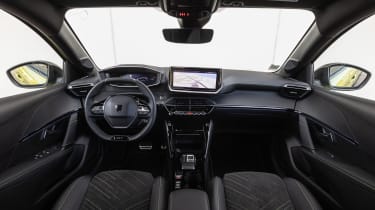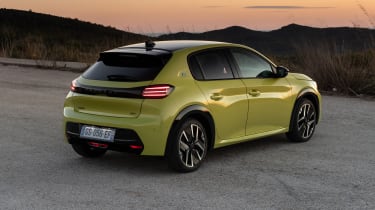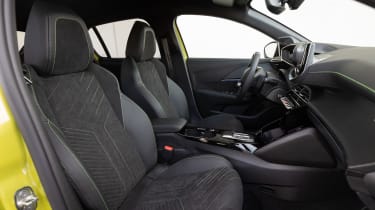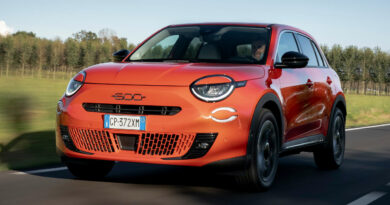New Peugeot E-208 2023 facelift review: boosted range and a funky new face
The e-208's new looks are attractive, but its high price dampens the appeal
3.5 out of 5
How we review carsFind your Peugeot 208Offers from our trusted partners on this car and its predecessors…
Inside, the old seven-inch infotainment system has been replaced on most versions by a 10-inch layout, although the resolution is crisper on the higher-end trim levels, Allure and GT. These versions also get a 10-inch digital instrument cluster, while the range-topping GT overlays projection-based 3D graphics onto the display.
We’re not driving it here, but you can still have an E-208 with the old spec of motor and battery. It has less range (225 miles) and makes do with just 134bhp, but gets its own better-specced trim level, E-Style, which costs only £250 more than the starting point for the updated powertrain. That means you can prioritise kit over range and performance, if you wish.
The new motor produces 154bhp – although as is common for Stellantis products, it only does this if you flick the car into Sport mode. The 51kWh battery is now capable of taking the E-208 up to 248 miles between recharges, according to the mixed WLTP efficiency test. There’s 100kW DC charging as standard, so en-route refills of 20 to 80 per cent should take less than 25 minutes.
Climbing aboard the E-208, you’re instantly reminded that this is one of the more compact superminis – one devoted to stylish touches more than outright practicality. The header rail feels low as you slide into either of the front seats, and things are even more compromised in the back, where headroom, legroom and kneeroom are all tight for anyone over six feet tall. The boot is a respectable 309 litres, but this is achieved through a fairly high load lip, and there’s no space beneath the floor, so you’ll have to throw your shopping on top of the charging cables.
Peugeot’s i-Cockpit layout, with a low-mounted small steering wheel that you look over the top of to see the instruments, is still a feature that won’t be to everyone’s liking. With our ample frame, we felt like we were wearing the car instead of sitting in it, and had to pull the wheel out too far for our liking, just for it to clear our knees.
The materials chosen for the cabin are a prime example of the difference between perceived quality and structural quality. They generally looked smart enough to us in our GT example, but the carbon-fibre weave-effect door panels and swathes of piano-black plastic feel nowhere near as premium when you actually touch them. There was a considerable disparity between the dashboard tolerances on either side of our car’s cabin, too – surprising on a car that’s been in production for several years.
Despite all of this, it’s still a slightly plusher environment in an E-208 than you’ll find in Vauxhall Corsa, and the materials are probably better resolved than they are in the likes of the BYD Dolphin or the MG4.
Things get better when you start to drive the E-208, because the new powertrain hasn’t changed the fundamentals of a well-sorted supermini. There’s decent compliance around town, where it’s rewarding to use the instant punch to nip in and out of traffic.
On faster roads the steering weights up a little inconsistently and there’s a fair bit of body roll and head toss, but in general the E-208 remains faithful in bends. It’s all very safe and predictable, with a soft enough set-up to just settle if you start lifting off mid corner. Throw in cruising comfort and a refined electric powertrain and you end up with a car that’s well suited to urban use but far from out of its depth on motorways. We wouldn’t say there’s much fun to be had here, though; this is not a car that really appreciates being chucked around.
The new powertrain has enough shove in Normal mode for most situations, although stamping on the throttle will activate a ‘kickdown’ that overrides the settings and brings in the full 154bhp and 260Nm of torque. You pay a high price for choosing Eco mode, mind you; it detunes the motor down to 80bhp, and even with 180Nm of torque, you can feel it.
Pricing may well be the E-208’s biggest issue because, even accounting for the increased range and power, it looks more expensive now than it did a year ago. Its starting price is £32,400; this is more than Volvo says it will charge for its entry-level EX30, and north of where BYD’s Dolphin – equipped with a larger 60kWh battery and a punchier motor – maxes out.
The GT driven here will cost you £36,250; that’s a huge amount of money for a supermini. It seems ludicrous to say this, but it’s alarmingly close to a Tesla Model 3 – a bigger and much more mature electric car. That lofty figure is one that Peugeot may struggle to overcome even with finance deals, given current interest rates.
| Model: | Peugeot E-208 GT 51kWh 156 |
| Price: | £36,250 |
| Powertrain: | 51kWh battery, 1x e-motor |
| Power/torque: | 154bhp/260Nm |
| Transmission: | Single-speed auto, front-wheel drive |
| 0-62mph: | 8.2 seconds |
| Top speed: | 93mph |
| Range: | 248mph |
| Charging: | 100kW (20-80% in 25min) |
| On sale: | Now |
Source: Read Full Article
